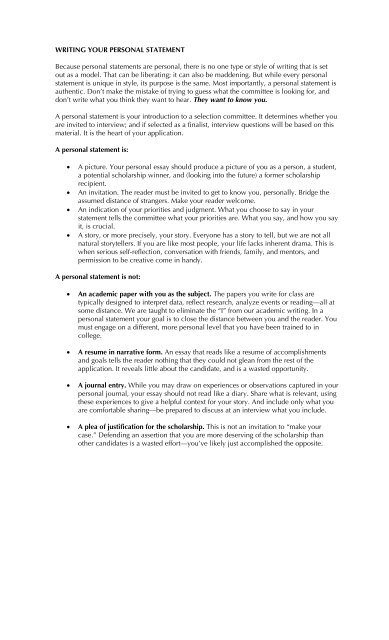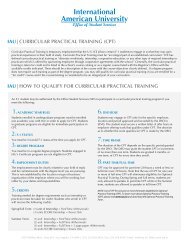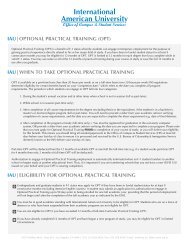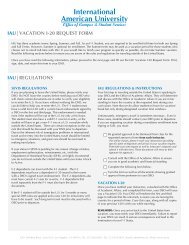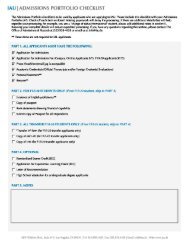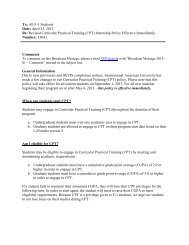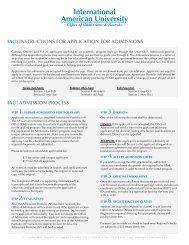WRITING YOUR PERSONAL STATEMENT Because personal ...
WRITING YOUR PERSONAL STATEMENT Because personal ...
WRITING YOUR PERSONAL STATEMENT Because personal ...
Create successful ePaper yourself
Turn your PDF publications into a flip-book with our unique Google optimized e-Paper software.
<strong>WRITING</strong> <strong>YOUR</strong> <strong>PERSONAL</strong> <strong>STATEMENT</strong><br />
<strong>Because</strong> <strong>personal</strong> statements are <strong>personal</strong>, there is no one type or style of writing that is set<br />
out as a model. That can be liberating; it can also be maddening. But while every <strong>personal</strong><br />
statement is unique in style, its purpose is the same. Most importantly, a <strong>personal</strong> statement is<br />
authentic. Don’t make the mistake of trying to guess what the committee is looking for, and<br />
don’t write what you think they want to hear. They want to know you.<br />
A <strong>personal</strong> statement is your introduction to a selection committee. It determines whether you<br />
are invited to interview; and if selected as a finalist, interview questions will be based on this<br />
material. It is the heart of your application.<br />
A <strong>personal</strong> statement is:<br />
<br />
<br />
<br />
<br />
A picture. Your <strong>personal</strong> essay should produce a picture of you as a person, a student,<br />
a potential scholarship winner, and (looking into the future) a former scholarship<br />
recipient.<br />
An invitation. The reader must be invited to get to know you, <strong>personal</strong>ly. Bridge the<br />
assumed distance of strangers. Make your reader welcome.<br />
An indication of your priorities and judgment. What you choose to say in your<br />
statement tells the committee what your priorities are. What you say, and how you say<br />
it, is crucial.<br />
A story, or more precisely, your story. Everyone has a story to tell, but we are not all<br />
natural storytellers. If you are like most people, your life lacks inherent drama. This is<br />
when serious self-reflection, conversation with friends, family, and mentors, and<br />
permission to be creative come in handy.<br />
A <strong>personal</strong> statement is not:<br />
<br />
<br />
<br />
<br />
An academic paper with you as the subject. The papers you write for class are<br />
typically designed to interpret data, reflect research, analyze events or reading—all at<br />
some distance. We are taught to eliminate the “I” from our academic writing. In a<br />
<strong>personal</strong> statement your goal is to close the distance between you and the reader. You<br />
must engage on a different, more <strong>personal</strong> level that you have been trained to in<br />
college.<br />
A resume in narrative form. An essay that reads like a resume of accomplishments<br />
and goals tells the reader nothing that they could not glean from the rest of the<br />
application. It reveals little about the candidate, and is a wasted opportunity.<br />
A journal entry. While you may draw on experiences or observations captured in your<br />
<strong>personal</strong> journal, your essay should not read like a diary. Share what is relevant, using<br />
these experiences to give a helpful context for your story. And include only what you<br />
are comfortable sharing—be prepared to discuss at an interview what you include.<br />
A plea of justification for the scholarship. This is not an invitation to “make your<br />
case.” Defending an assertion that you are more deserving of the scholarship than<br />
other candidates is a wasted effort—you’ve likely just accomplished the opposite.
<strong>PERSONAL</strong> <strong>STATEMENT</strong> TOPICS<br />
Here are some topics you may want to include in your <strong>personal</strong> statement. Try to select no<br />
more than 1-2 topics. Keep the statement to no more than 2 pages double-spaced 12 pt font.<br />
1. Reasons for select the area of study that you wish to focus on<br />
List/explain the factors that attracted you to this specialty.<br />
Why do you feel well-suited for this specialty?<br />
Discuss nature of work<br />
Desire to make contribution to business<br />
2. Relevant Experience<br />
Discuss any paid or voluntary work experience that is relevant to this specialty<br />
(i.e., research)<br />
Research accomplishments, publications, and/or awards<br />
3. Skills/attributes you possess that are valued by the specialty<br />
Inter<strong>personal</strong><br />
Intellectual<br />
Perceptual, motor<br />
4. Personal Goals<br />
Long-range career plan<br />
Academic, private, etc.<br />
Philanthropy<br />
5. What are you looking for in a program?<br />
What do you want?<br />
What do you have to offer?<br />
What contributions can you make to the program?<br />
Discuss aspects you feel are important in a program.<br />
6. “Human interest” information<br />
Family<br />
Regional/cultural background<br />
Interest outside of medicine<br />
Extra-curricular activities (not related to medicine), hobbies, unusual travel<br />
experience, etc.<br />
Any special qualities


